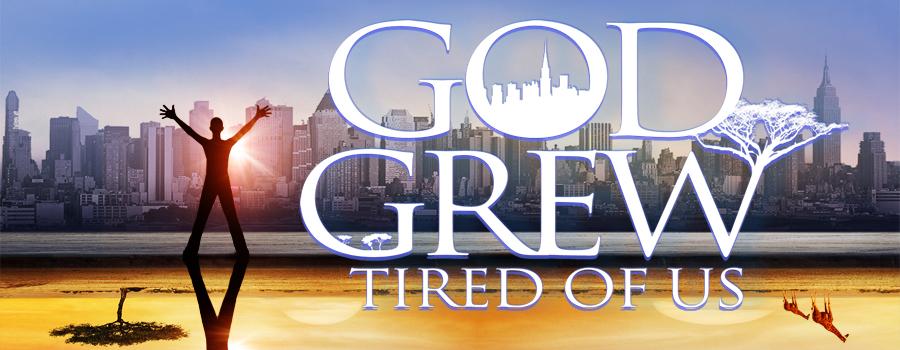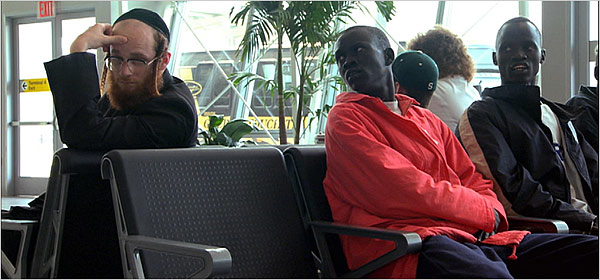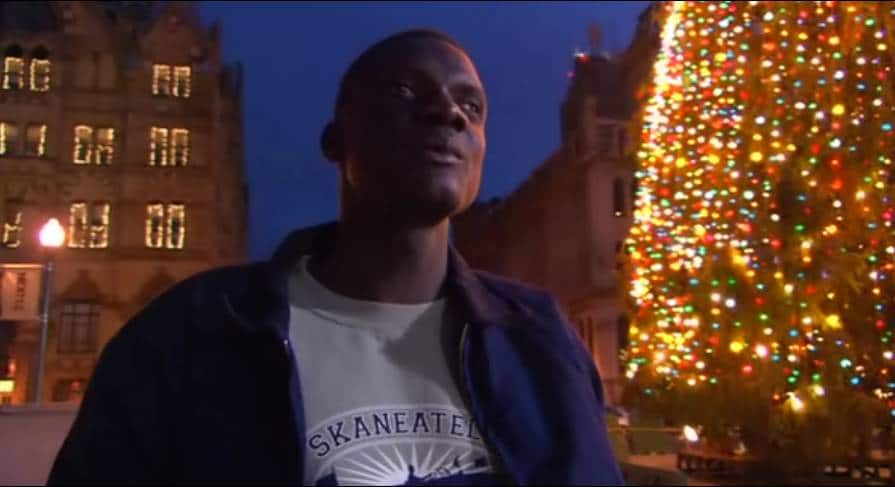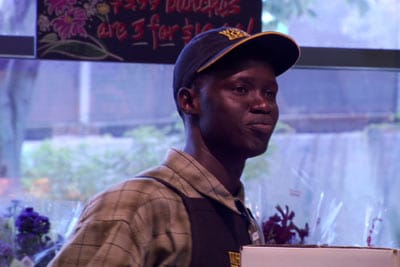 Can a documentary adhere to the storytelling structure of the Blake Snyder Beat Sheet? It definitely can, as God Grew Tired of Us demonstrates. The winner of several awards, including the 2006 Sundance Film Festival Grand Jury Prize for Documentary, the film serves to show that when the principles of good storytelling are applied, the power of transformation can be witnessed.
Can a documentary adhere to the storytelling structure of the Blake Snyder Beat Sheet? It definitely can, as God Grew Tired of Us demonstrates. The winner of several awards, including the 2006 Sundance Film Festival Grand Jury Prize for Documentary, the film serves to show that when the principles of good storytelling are applied, the power of transformation can be witnessed.
Written by: Christopher Dillon Quinn
Directed by: Christopher Dillon Quinn & Tommy Walker
Genre: It’s difficult to classify this one. In one sense, it’s a Solo Fleece, with each subject on his quest to better himself and others as the “prize.” In another sense, it resonates with Institutionalized because each one makes a choice to adhere to his culture and not become fully assimilated to American ways, ultimately willing to make a sacrifice of personal happiness for the betterment of others. Still, there is a Fool Triumphant element in that there is “transmutation” as they are changed by the world around them yet make their own mark on it. What do you think? Sound off in the comments below!
Opening Image: A list of names and destinations is stapled to a wooden board, closely inspected by those in the refugee camp who ponder their futures.

Set-Up: The documentary follows the lives of three Sudanese Lost Boys: Daniel Abol Pach, his friend Panther Bior, and John Bul Dau. As the men tell about their past in Sudan and the atrocities they witnessed during the war, Panther laments the fact that his memories of his home are slipping away, as he fled when he was very young.
Theme Stated: John Bul Dau reflects on his experiences and states, “You should be proud of who you are.” When he and the other Lost Boys relocate to America, they will need to hold on to this sense of cultural pride and individuality as they integrate with a society that is alien to them.
Set-Up (continued): Narrator Nicole Kidman discusses the history of the Sudanese civil war, and how in 1987, the government in the north ordered that all male children in the south were to be killed, regardless of age. The men share their backstories of how they escaped, witnessing their villages being burned. Those who survived formed “family groups” to take care of one another, fleeing to Ethiopia. However, after three years, the Ethiopian government toppled and they were forced to flee to Kenya, where relief groups waited.
At the Kakuma camp, home to 86,000 refugees, donations of food and clothing sustained those there. The United Nations provided an education program, but after the boys had completed it, they were faced with a Stasis=Death moment; there was nothing left to do. With no improvement in Sudan, they did not know where they were supposed to be. John Bul Dau reinforces this idea, stating that it was like “waiting for your grave.” In their thesis world, these men have lived with little and have survived by sticking together.
Catalyst: The Opening Image is once again shown, and it is revealed that the United States government has agreed to relocate some of the Lost Boys to America to provide them with hope and a future.
Debate: Where will they go? What will this new life in America be like? As the subjects of the documentary ask questions about things like showers, apartments, and electricity, they reveal that they are sad to depart. It is upsetting because they shared such a close-knit bond in their struggle for survival. Leaving each other behind seems unfathomable, but it is what must be done. While Daniel and Panther will relocate to Pittsburgh together, John will live in Syracuse, New York. As they bid a bittersweet farewell to their friends, they reflect on their past and their potential future. They begin to get their first glimpse of life outside Kakuma, flying on an airplane and walking through airports.

Break into Two: The Lost Boys of Sudan arrive at their destinations, and their journey into an upside-down world is about to begin.
B Story: Because the Lost Boys had to rely on each other for survival, this will form the B Story, their underlying relationships with each other and with their mother country of Africa. As they enter American culture, these relationships will be tested, as will their resolve.

Fun and Games: The promise of the premise begins, asking, “What would it be like for these men to leave Africa and enter our modern-day culture?” As Daniel and Panther are introduced to their new apartment, a social worker teaches them the basics of how to use things like a light switch, hot and cold water, a shower, a toilet, and more. A visit to a local grocery story yields a stunned reaction at the variety and amount of food available. We get a glimpse at how the men live on their own, grinding crackers with a hammer’s handle and turning the crumbs into a soup.
Viewing television for the first time, John is stunned to see how women are portrayed and sexualized. John questions why he is so lucky and reflects on his past, how he was forced to care for a group of 1,200 boys and bury dead bodies, saying that during the difficult times, he felt as if God had grown tired of humanity, wishing to destroy everyone. Still, he demonstrates his resolve, knowing that others have hope in him to make a life for himself in America, giving him the means to sustain others.

Midpoint: Time clocks appear as the social worker helps the men obtain Social Security cards; they will have three months to find a job and be on their own. Two months later, the men celebrate Christmas. A and B Stories cross as John reflects on the differences between how Christmas is celebrated in Africa versus how Americans observe the holiday. In Africa, it is a time to prepare one’s heart, a much different image than the Santa Claus he sees at the local mall. John misses his friends, and he reinforces the theme, saying, “A person without culture is like a human being without land.”
Bad Guys Close In: In their cities, John, Daniel, and Panther begin working, adjusting to the American way of life. John is employed at a factory producing gaskets, proud of his work. He also goes against his culture’s tradition of women being the ones who cook when he takes a job at the local McDonald’s. As the men continue to work, the Bad Guys of cultural differences and loneliness seem to assault them. In their antithesis world, they are living with an abundance of resources at their disposal but do not have the time to spend with each other as they once did at Kakuma. They must also deal with cultural perceptions of who they are, learning that local merchants feel uncomfortable when they spend time together in groups as they did back home.
While Daniel and Panther are separated so that Daniel can work with the Job Corps, John enrolls in college to better himself. However, when he receives a letter from his newly-located parents and sisters, he learns that they are all ill in a Ugandan refugee camp, and many of the family and friends he once knew are now dead. John drops out of college to work more jobs to support his friends and family back in Africa, sacrificing his happiness for the sake of others.
All Is Lost: One of the other Lost Boys in Pittsburgh has gone missing for several days, and the others fear for his life. The police find him later, mentally unstable, and he is admitted to a psychiatric hospital. Daniel talks about how the war has affected the Lost Boys, who can’t have the same happiness as other people, such as simply walking with their families. The whiff of death is evident as he discusses their feelings of hopelessness and how some have a desire to kill themselves.
Dark Night of the Soul: Daniel reflects, asking, “What can we do?” He desires to make his friends’ lives better, a reflection of A and B Stories meeting. John Bul Dau serves as a security guard in one of his jobs, believing that God made him tall for a purpose, that we all have a role to play, and that we are all born to do something. He declares that one thing he can do is help apply for his mother and sister to come to America, but realizes that is not his limit.
Break into Three: John understands that he must embrace his culture and his identity in this new world if he is to help others and make a difference, the theme resonating loudly in the synthesis world.

Finale: John serves to raise awareness of the situation in Sudan, speaking to groups and organizing support. Panther continues to work hard and get an education, his dream being to go back to Africa and marry his girlfriend. He graduates and realizes that he can put his knowledge to use and help his country move in the right direction by building schools to teach others how to exploit the resources. Daniel works at a supermarket, and he, too, applies his cultural norms for the good of others, using the people skills he learned at Kakuma to reach out to those in need. In a heartwarming moment, John is reunited with his mother and sister at the airport, at long last finding happiness at the end of a journey filled with hardship.
Final Image: As Panther prepares for his journey back to Africa to meet his bride, his memories of the land he loves flood back to him. He walks through the airport like a cowboy riding off into the sunset, remarking about how happy he is to be returning home. “I’m going to Africa,” he says.
Cory Milles
1 Comment
Leave a Reply Cancel reply
You must be logged in to post a comment.










Fantastic summary! I found myself leaning into my computer screen to see what would happen next in the story. You did an excellent job here. I will check out this film.